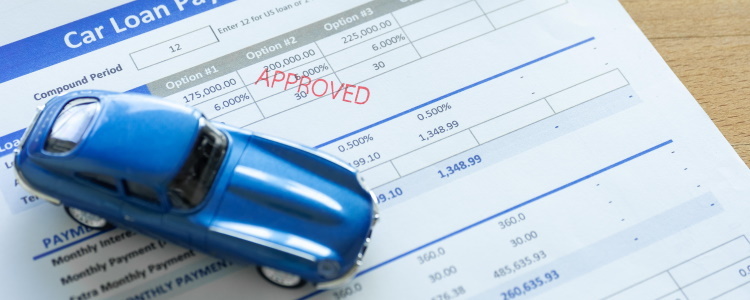If you owe more money on your vehicle than it’s actually worth, this is called having negative equity. It doesn’t become a problem until you need to sell your car or get another one, but when that time does come, it can cause some headaches. Here’s what you can do about it.
Do You Owe Too Much on Your Car Loan?
 Whether or not you owe too much on your vehicle can depend on who you ask, but your loan balance becomes a problem if you can’t sell the car for what you owe on the loan.
Whether or not you owe too much on your vehicle can depend on who you ask, but your loan balance becomes a problem if you can’t sell the car for what you owe on the loan.
If you owe more than your vehicle’s value, you’re in a negative equity position. When you owe less on the car than it’s worth, it's called having equity. Equity is useful for when you want to upgrade to another vehicle. You can trade in your car with equity, and use that equity to lower the cost of your next vehicle.
However, with negative equity, it's the opposite situation and you’re likely to be told that you owe too much on the auto loan.
To sell a car with a loan on it, you must completely pay off the balance to remove the lienholder (your lender) from the vehicle’s title. Until that auto loan is paid off, your lender has rights to the car, and you can’t sell it unless the lien is removed.
So, how do you sell a vehicle when you owe too much money on it, and any sale offers won’t cover your loan balance? You have a few options, actually.
1. Pay Off the Negative Equity
You can diligently pay off the negative equity with windfalls, like tax refunds or work bonuses. Alternatively, you can make extra payments or round up your car payments each month.
Paying off an auto loan that you owe too much on with a lump sum isn’t the easiest option for many borrowers, especially if you have a higher than average interest rate. Most car loans use a simple interest formula. This means you’re charged interest daily on the balance of your loan. The more you borrow, the longer your loan typically is; and the higher your interest rate, the harder it can be to stay out of negative equity.
However, the faster you pay off your loan, the less interest charges stack up. The quicker you pay off the vehicle, the more money you save in interest charges.
2. Wait it Out
Deprecation – what lowers a car’s value over time – happens to every vehicle and it never stops. However, it slows down, meaning your car is likely to lose less value each year. Typically, most assets in a negative equity position can start to earn equity with on-time payments and some patience.
If you keep paying on your auto loan until your loan balance is less than or equal to what you can sell the vehicle for, you’ve entered an equity position. You’re going to have a much easier time getting a trade-in offer that’s closer to what the car is worth, and you may even walk away from the sale with extra money in your pocket.
Like we mentioned, having negative equity isn’t typically a problem until you need to sell the vehicle. If you can’t wait until you’ve earned equity to sell the car that you owe too much on, there’s a way to get into another auto loan.
3. Rolling Over Negative Equity
If you’re starting to get in over your head and you can't pay off the negative equity or wait it out, you may be able to roll that negative equity into your next loan.
Rolling over your negative equity simply means adding it to your next car loan. Say you’re looking to purchase a vehicle for $10,000, and you have $2,000 in negative equity on your current loan. The dealership could buy your current car, and pay off your entire loan balance to your lender. The negative equity that the dealer paid off is then added to the amount you’re financing for the next vehicle. So, instead of financing for $10,000, the loan balance is going to be $12,000.
While this seems like a good idea on the surface, you’re starting out your next auto loan owing too much again. Often, borrowers are stuck continually rolling over their negative equity onto their next car – again and again – and this is called the trade-in treadmill.
If you’re in need of another vehicle and you have no choice but to roll over the negative equity, consider an inexpensive car for the time being until you can pay off any negative equity. Set yourself up for success by not overdoing it with a high loan amount, and choose one that you can pay off quickly so you can enter an equity position.
Remember, the quicker you pay off an auto loan, the more money you save. Once you’ve paid off the loan, that vehicle can be used as an equity trade-in and help lower the cost of your next car purchase.
Auto Loans With Bad Credit
Car buying and borrowing can sometimes be a bit of game, and it’s vital to your financial health to play wisely. Choose loan terms that you can comfortably afford and pay off as soon as possible to avoid lots of interest charges and lower the risk of negative equity. Knowing that you owe too much on a vehicle can be stressful, so start off any auto loan on the right foot and try to begin in an equity position.
Although, having a bad credit score can make getting approved for a car loan difficult. There are auto lenders that can work with poor credit, though, and they’re called subprime lenders. They’re signed up with special finance dealerships, and they look at more than just your credit reports to determine your eligibility to take on a car loan.
If you want to get connected to a dealer with bad credit lending resources, start right here with us at Auto Credit Express. We’ve produced a nationwide network of special finance dealerships, and we’ll look for one in your area after you complete our free auto loan request form.















